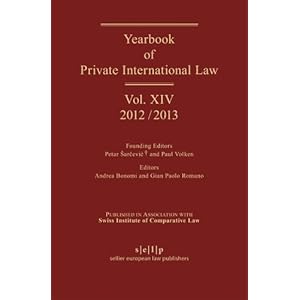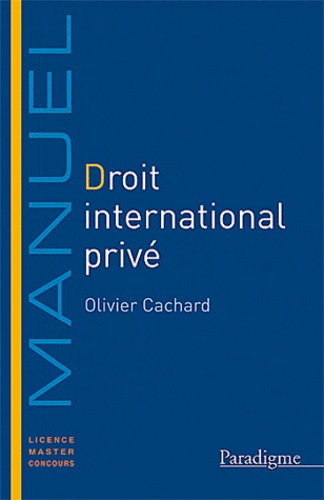Yearbook of Private International Law, Vol. XIV (2012-2013)
 The latest volume of the Yearbook of Private International Law was just released.
The latest volume of the Yearbook of Private International Law was just released.
Doctrine
- Marc Fallon & Thalia Kruger, The Spatial Scope of the EU’s Rules on Jurisdiction and Enforcement of Judgments: From Bilateral Modus to Unilateral Universality?
- Pierre Mayer, Conflicting Decisions in International Commercial Arbitration
- Horatia Muir Watt, A Semiotics of Private International Legal Argument
- Thomas Kadner Graziano, Solving the Riddle of Conflicting Choice of Law Clauses in Battle of Forms Situations: The Hague Solution
- Sirko Harder, Recognition of a Foreign Judgment Overturned by a Non-Recognisable Judgment
- Marta Requejo Isidro, The Use of Force, Human Rights Violations and the Scope of the Brussels I Regulation
A General Part for European Private International Law?
- Stefan Leible & Michael Müller, The Idea of a “Rome 0 Regulation”
- Luís de Lima Pinheiro, The Methodology and the General Part of the Portuguese Private International Law Codification: A Possible Source of Inspiration for the European Legislator?
Protection of Personality Rights
- William Bennett, New Developments in the United Kingdom: The Defamation Act 2013
- Laura E. Little, Internet Defamation, Freedom of Expression, and the Lessons of Private International Law for the United States
- Michel Reymond, Jurisdiction in Case of Personality Torts Committed over the Internet: A Proposal for a Targeting Test
- Thomas Thiede, A Topless Duchess and Caricatures of the Prophet Mohammed: A Flexible Conflict of Laws Rule for Cross-Border Infringements of Privacy and Reputation
The Chinese Private International Law Acts: Some Selected Issues
- Jin HUANG Creation and Perfection of China’s Law Applicable to Foreign-Related Civil Relations
- Yujun Guo, Legislation and Practice on Proof of Foreign Law in China
- Yong Gan, Mandatory Rules in Private International Law in the People’s Republic of China
- Qisheng He, Changes to Habitual Residence in China’s lex personalis
- Guangjian Tu, The Codification of Conflict of Laws in China: What Has/Hasn’t Yet Been Done for Cross-Border Torts?
- Wenwen Liang, The Applicable Law to Rights in rem under the Act on the Law Applicable to Foreign-Related Civil Relations of the People’s Republic of China
- Weidong Zhu, The New Conflicts Rules for Family and Inheritance Matters in China
News from Brussels
- Susanne Knöfel / Robert Bray, The Proposal for a Common European Sales Law: A Snapshot of the Debate
- Maria Álvarez Torne, Key Points on the Determination of International Jurisdiction in the New EU Regulation on Succession and Wills
National Reports
- Adi Chen, The Limitation and Scope of the Israeli Court’s International Jurisdiction in Succession Matters
- Sandrine Giroud, Do You Speak Mareva? How Worldwide Freezing Orders Are Enforced in Switzerland
- Anil & Ranjit Malhotra, All Aboard for the Fertility Express: Surrogacy and Human Rights in India
- Tuulikki Mikkola, Pleading and Proof of Foreign Law in Finland
- Zeynep Derya Tarman, The International Jurisdiction of Turkish Courts on Personal Status of Turkish Nationals
Forum
- Rui Pereira Dias, Suing Corporations in a Global World: A Role for Transnational Jurisdictional Cooperation?
- Johanna Guillaumé, The Weakening of the Nation-State and Private International Law: The “Right to International Mobility”
- Tamas Dezso Czigler / Izolda Takacs, Chaos Renewed: The Rome I Regulation vs Other Sources of EU Law: A Classification of Conflicting Provisions
 The second edition of Professor Olivier Cachard’s manual on private international law was just released.
The second edition of Professor Olivier Cachard’s manual on private international law was just released. The 10th edition of the French manual of Loussouarn, Bourel and Vareilles-Sommieres on private international law was published a few weeks ago.
The 10th edition of the French manual of Loussouarn, Bourel and Vareilles-Sommieres on private international law was published a few weeks ago.